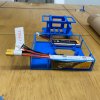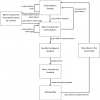During the previous competition, one of the problems that we noticed was that our blimp was not mobile enough to navigate the windy environment inside MESH in Indiana. Therefore, one of our focuses in the past couple of weeks was to mechanically improve our blimp. This includes replacing the motors...
The main focus of this week was to familiarize with the use of brushless motors so that we can transition our system to use BLDC instead of regular DC motors. First we had to make sure that we can run it using an ESP32. In order to do that, we utilized Adafruit Servo Shield, which allows us to conne...
After the post-mortem from the previous competition, we started by identifying the small problems that we had to fix before integrating the whole system. There were multiple issues being handled both from the hardware and the software perspectives. First, the main chassis that will hold the micro...
In order to see the goals taped with the retro-reflective tape, we attached our robot with an IR LED and take a picture of the frame. Then, we take a picture with the LED off. By setting a specific threshold, we can find pixel with the difference between the 2 images being more than the specified re...
Previously, a P controller was used for simplicity as it removes the requirement of keeping track of time at each time step. However, with the unstable motion of the blimp, a PID controller is needed to further stabilize the system. This is the result: The parameters were tuned based on the trac...
In the past 2 weeks, I tried to develop and algorithm that can be used if we have a blimp that have a camera facing down. With the camera, we would be able to detect the field of interest and control the robots within the field. In this case, the current algorithm can be used to control any vehicle...
Last week, the engineering effort was focused on setting up the hardware and building the blimp and any other required electronic components. Initially, we couldn't set it up using the balloon that we bought from Amazon, so we had to reuse the blimp that was used in the previous tournament. Due to t...
Building upon the work that was done last week, the goal this week was to include some sort of motion actuation to demonstrate that a vehicle can track a specific blob of a specific color using the OpenMV camera. However, due to setback in the goal of making a blimp, we decided to proceed with a sma...
First, the camera detected all the blobs of within the camera frame. The color along with its horizontal and vertical position are encoded into a 7-character string, which is then sent to the feather board using the i2c protocol. the feather board iterates through list of string. If the color code m...
In order to automate the blimp, we need to consider the problems that we need to solve. By doing research in the behavior of previous manually-controlled blimps and understanding the challenges that the blimp might face to achieve its goal of collecting the green balloons, a function block diagram w...

